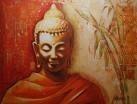LORD BUDDHA
In Buddhism, buddhahood (Sanskrit: बुद्धत्व buddhatva; Pali: बुद्धत्त buddhatta or बुद्धभाव buddhabhāva) is the state of perfect enlightenment (Sanskrit: सम्यक्सम्बोधि samyaksambodhi; Pali: सम्मासम्बोधि sammāsambodhi) attained by a buddha (English pronunciation: /ˈbuːdə/ or /ˈbʊdə/; Sanskrit pronunciation: [ˈbud̪d̪ʱə] ( listen); Pali/Sanskrit for "awakened one").
In Buddhism, the term buddha usually refers to one who has become enlightened (i.e., awakened to the truth, or Dharma). The level to which this manifestation requires abstraction from ordinary life (ascetic practices) varies from none at all to an absolute requirement, dependent on doctrine. In Theravada Buddhist traditions, it is held that the person attains this state on their own, without a teacher to point out the Dharma, in a time when the teachings on the Four Noble Truths or the Eightfold Path do not exist in the world, and teaches it to others. In contrast, certain Mahayana Buddhist traditions (particularly those that consider the teachings of the Lotus Sutra to be paramount, which contains this concept) Buddhahood is considered to be a universal and innate property of absolute wisdom that is revealed in a person's current lifetime through Buddhist practice, without any specific relinquishment of pleasures or "earthly desires". Thus, there is an extremely broad spectrum of opinion on the universality and method of attainment of Buddhahood which is correlated to which of Shakyamuni Buddha's teachings that a school of Buddhism follows.
More broadly, it is occasionally used to refer to all who attain nirvana. In this broader sense it is equivalent to Arahant. According to Theravada Buddhism, all Arahants (or Buddhas in the broader sense) are the same in the most fundamental aspects of Liberation (Nirvana), but differ in their practice of perfections paramis. Mahayana Buddhism, however, considers there is a fundamental difference between Buddhas and ordinary arhants, on the way to becoming a Buddha, a Buddhist proceeds through bodhisattva stages. Buddhists do not consider Siddhartha Gautama to have been the only Buddha. The Pali Canon refers to many previous ones (see List of the 28 Buddhas), while the Mahayana tradition additionally has many Buddhas of celestial, rather than historical, origin (see Amitabha or Vairocana as examples, for lists of many thousands Buddha names see Taishō Shinshū Daizōkyō numbers 439–448). A common Theravada and Mahayana Buddhist belief is that the next Buddha will be one named Maitreya (Pali: Metteyya).
Membres
